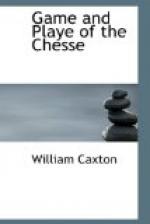The printing of this book began in 1872, when the title-page and earlier sheets were worked, but it was not finished until May, 1879. This is the second time that Mr. Pitman has printed the Chess-book in his reformed orthography. The first issue was in 1855. Although the title-page repeats the old belief that “The Game of Chess” was the first book printed in England, and gives the date of 1474, it is really a reprint of the second edition of Caxton.
(Sloane’s version.)
The Buke of the Chesse. Auchinleck Press. 1818. 4to.
This is printed from a MS. which is believed to have been written about the beginning of the sixteenth century. The work is in verse, and ends: “Heir endis y’e buke of y’e Chess, Script per manu Jhois Sloane.” Only forty copies were reprinted by Sir Alexander Boswell at the Auchinleck Press.
(Linde. Lowndes.)
The “Game and Play of the Chess” is an interesting specimen of mediaeval English literature. It is so near our own time that the language prefents few difficulties, in spite of its many Gallicisms, and yet it is so remote as to seem like the echo of an unknown world. The distinctly dogmatic portions of the book are but few, and their paucity is indeed a matter of some surprise, since it is in effect a detailed treatise on practical ethics, and is, in part if not wholly, systematized from the discourses of one distinguished preacher, who had borrowed much of his matter from another eminent ecclesiastic. The author aims not at the enforcement of doctrine, but at the guidance of life, though he no doubt assumes that his hearers are all faithful and orthodox sons of the Church.[22]
The ideal of the commonwealth of the middle ages finds an interesting expression. The sharp lines of demarcation between class and class are stated with the frankness that comes of a belief that the then existing social fabric was the only one possible in the best of worlds. There is no doubt in the author’s mind as to the rightful position of king and baron, of bishp and merchant. The “rights of man” had not been invented, apparently, and the maxim that the king reigns but does not govern, would have perplexed the souls of Cessoles and his translators. They had no more doubt as to the divine right of the monarch, than the Thibetan has of the divine right of the grand lama. The Buddhist thinks he has secured the continuous re-appearance of supernatural wisdom in human form, and the regular transmission of political ability in the same family was the ideal for which the devotees of mediaeval despotism had to hope. Nothing could be further from the aspirations of our author than a race of mere palace kings seeking enjoyment only in self-indulgence. The king was to be the ruler and leader of his people. The relation and interdependence of the several classes is emphatically proclaimed, and the claims of duty are urged upon each.




